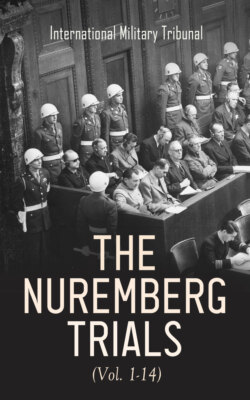Читать книгу The Nuremberg Trials (Vol. 1-14) - International Military Tribunal - Страница 135
На сайте Литреса книга снята с продажи.
The Common Plan of Conspiracy and Aggressive War
ОглавлениеTable of Contents
The Tribunal now turns to the consideration of the Crimes against Peace charged in the Indictment. Count One of the Indictment charges the defendants with conspiring or having a common plan to commit crimes against peace. Count Two of the Indictment charges the defendants with committing specific crimes against peace by planning, preparing, initiating, and waging wars of aggression against a number of other States. It will be convenient to consider the question of the existence of a common plan and the question of aggressive war together, and to deal later in this Judgment with the question of the individual responsibility of the defendants.
The charges in the Indictment that the defendants planned and waged aggressive wars are charges of the utmost gravity. War is essentially an evil thing. Its consequences are not confined to the belligerent States alone, but affect the whole world.
To initiate a war of aggression, therefore, is not only an international crime; it is the supreme international crime differing only from other war crimes in that it contains within itself the accumulated evil of the whole.
The first acts of aggression referred to in the Indictment are the seizure of Austria and Czechoslovakia; and the first war of aggression charged in the Indictment is the war against Poland begun on 1 September 1939.
Before examining that charge it is necessary to look more closely at some of the events which preceded these acts of aggression. The war against Poland did not come suddenly out of an otherwise clear sky; the evidence has made it plain that this war of aggression, as well as the seizure of Austria and Czechoslovakia, was premeditated and carefully prepared, and was not undertaken until the moment was thought opportune for it to be carried through as a definite part of the pre-ordained scheme and plan. For the aggressive designs of the Nazi Government were not accidents arising out of the immediate political situation in Europe and the world; they were a deliberate and essential part of Nazi foreign policy.
From the beginning, the National Socialist movement claimed that its object was to unite the German People in the consciousness of their mission and destiny, based on inherent qualities of race, and under the guidance of the Führer.
For its achievement, two things were deemed to be essential: the disruption of the European order as it had existed since the Treaty of Versailles, and the creation of a Greater Germany beyond the frontiers of 1914. This necessarily involved the seizure of foreign territories.
War was seen to be inevitable, or at the very least, highly probable, if these purposes were to be accomplished. The German People, therefore, with all their resources, were to be organized as a great political-military army, schooled to obey without question any policy decreed by the State.
